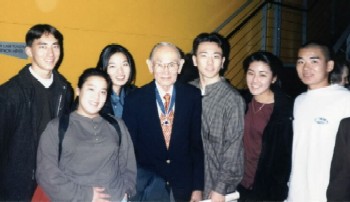
ALL ABOUT ME
|
|
|
Being a J School Days At Present Favorite Things WHY? |
|
|

It's all about Stanford University Nikkei (SUN), baby!!!
As I said on my Personal Info page, I'm a 4th Generation Japanese American (YoNsEiz rEpResEnT!!!). While I would contend that there is a distinct JA culture, I will refrain from making any statements that might be construed as an attempt to encompass or represent the entire JA diaspora. Instead, I will be speaking of my perceptions of being an American of Japanese descent, viewed only through the lens of my own life experiences. I understand that there are many facets to "THE" JA Culture, but please understand that this is only one of them, and is not making the pretense of being anything more. (Was that a long enough disclaimer?)
With that, where do I begin? Perhaps a better question is where do others begin? Without a doubt, my cultural identity is a large part of who I am, and is a part I take much pride in. However, it's not ALL that I am. I'm not just a Japanese American...I'm a painter, a poet, a perpetual student of life, a Pokemon Master...but at a glance, what shows besides my yellow skin and slanted eyes? To me, much of being JA is comprised of explaining to people that I'm Japanese, not Chinese or Korean, and that my parents speak English so well because they were BORN here...
But being a J also means Scouting at Nishi, ballin' in SEYO, visiting JANM with my parents, hittin' up the Obons with my friends. It's knowing that 5/5 is OUR day (by OUR, I mean BOYS...you girls edged in on OUR day...), and that New Year's (why don't we get those little red envelopes like the Chinese?) will bring awesome food and sake. Kampai!!! It's being pissed at White America for throwing our grandparents into concentration camps, and feeling a sense of pride for all the soldiers of the 442nd/100th/and MIS.
It's asking other Yonseis "do you speak?" and knowing their vocabulary is as extensive as mine: bakatare, monkutare, yakamashii, unko, shishi, and benjo. If you don't know what these words mean, don't ask, and don't use them...but if you're a fellow J and know what I'm talking about, FYI, benjo is supposed to be toire, and you're ancestors were as country as mine...
Being JA means drinking only Japanese beer, loving sushi, fixing up the rice rocket, bumpin' J-pop even though we can't understand it, and feeling a (false? nah...) sense of entitlement to all these things - complaining about how "wrong" it is when non-Japanese people do the same.
But for me, I think the best part of being a J is that special bond that is immediately forged when two Nikkeis meet. While my conception of the JA Experience will indubitably be different in some respects than that of the person I meet, I know that he or she knows that we know that we have something in common. You know? And it is these commonalities that I feel must be preserved and passed on if the next generation is ever to feel this same bond with a fellow J. We Nikkei are a dying breed. Each one of us has the responsibility to learn the stories of our ancestors, for their experience is very much a part of ours. And each of us has the responsibility of sharing not only those stories, but our own as well. Only when all of these individual pieces come together can the full beauty of the mosaic that is The JA Culture be seen.
For a great resource to LA's JA Life (current issues, events, etc.), click on this link to see the Japanese American Network.
While there, check out their "just for fun" section. It's worth it! Or if you're too lazy (I empathize), click here for Ways to Tell if You're Japanese American by Tony Osumi and Jenni Kuida from the Rafu Shimpo.
For more on the JA Experience, past and present, click on this link to check out the Japanese American National Museum. And if you haven't already, become a Member!